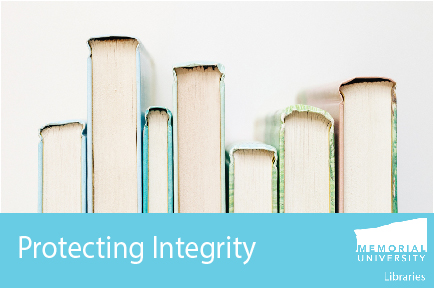Protecting Integrity

Memorial University is addressing academic integrity with a new course for first-year, full-time undergraduate students. The university-wide pilot is being developed by Memorial University Libraries, in collaboration with the Senate Committee on Undergraduate Studies, and aims to create and foster a culture of academic integrity.
Academic integrity – principled ethical practice within university and academic environments – will become part of the essential introductory information new students receive when they enroll at Memorial.
“In the past, we have found that academic integrity had been mentioned many times in the classroom, but a lot of students don’t really know what it means. As a university, it is important for us to tell students what we mean by academic integrity and explain there is a responsibility and an expectation associated with it,” said Dr. Echo Pittman, associate registrar (academic advising and outreach).
“Academic integrity is more than simply obeying rules. It is about providing students with the ability to make the right choices.”—Louise White
The interactive online courses (INTG 100A/B) are mandatory for all full-time, first-year undergraduate students starting in the fall of 2016. Students must successfully complete the courses with 80 per cent or above to continue their studies at Memorial University. The course is also required for any undergraduate students who have been found guilty of academic misconduct by the Senate Committee on Undergraduate Studies.
The course is designed to be quick, but thorough enough to provide students with a sense of the academic standards at Memorial. It’s expected to take three hours or less on average for successful completion.
“The first section of the course really focuses on what academic integrity is, why it’s important and how it is defined and regulated at Memorial,” explained Lorna Adcock, public services librarian with Memorial University Libraries and course coordinator. “The second part of the course provides information about how students can complete their work with academic integrity and looks at the different components they might be involved in such as academic writing, test taking, research ethics, completing lab reports and even experiential learning or working within the community.”
“The academic integrity course is the first Senate-approved course that Memorial University Libraries has created and coordinated,” said Louise White, interim university librarian. “We are often the first point of contact for first-year students as they begin their academic journey so it is a natural fit for us to support students and contribute to Memorial’s broader scholarly and research outcomes. Academic integrity is more than simply obeying rules. It is about providing students with the ability to make the right choices.”
Memorial has a robust support system for students with questions and concerns about academic integrity, including the libraries, the Writing Centre, academic advising, and learning and help centres, but incidents of plagiarism, cheating and the use of unauthorized study aids are on the rise across the country.
“Our statistics of academic misconduct are on par with other Canadian universities,” said Jennifer Porter, deputy registrar, Office of the Registrar. “And we want to be more proactive on the issue. Ultimately it comes down to protecting the university’s integrity and making sure we are all very proud of the degree that we hold from Memorial.”
